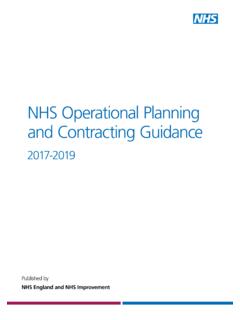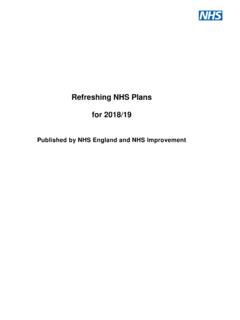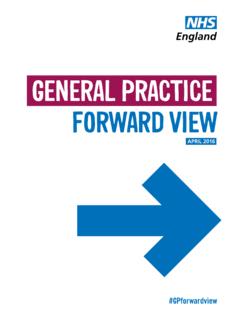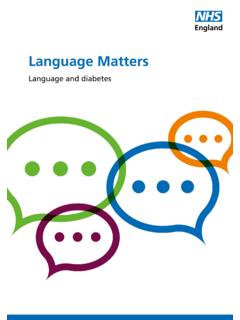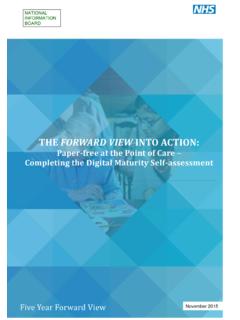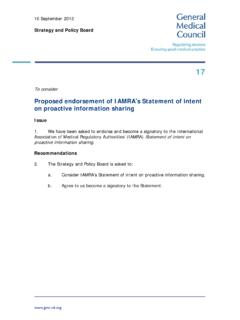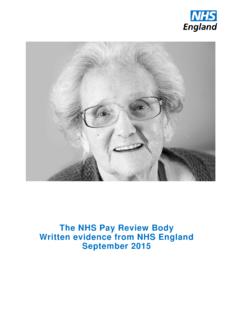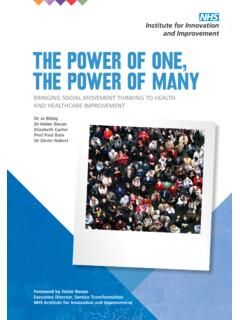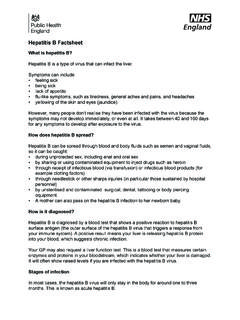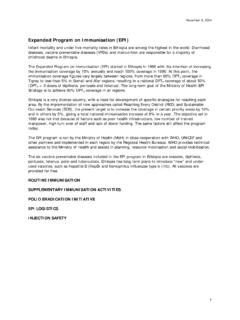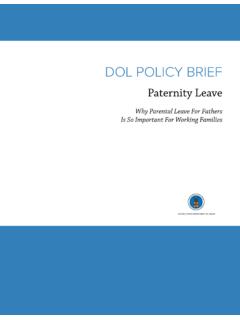Transcription of Involving and supporting partners and other family …
1 1 South London and MaudsleyNHS Foundation TrustGood practice guideMarch 2021 Involving and supporting partners and other family members in specialist perinatal mental health servicesZoe Darwin, Jill Domoney, Jane Iles, Florence Bristow, Jenny McLeish, and Vaheshta Sethna2 Equality and health inequalitiesPromoting equality and addressing health inequalities are at the heart of NHS England s values. Throughout the development of the policies and processes cited in this document, we have: Given due regard to the need to eliminate discrimination, harassment and victimisation, to advance equality of opportunity, and to foster good relations between people who share a relevant protected characteristic (as cited under the Equality Act 2010) and those who do not share it; and Given regard to the need to reduce inequalities between patients in access to, and outcomes from, healthcare services and to ensure services are provided in an integrated way where this might reduce health inequalities.
2 Information Governance StatementOrganisations need to be mindful of the need to comply with the Data Protection Act 2018, the EU General Data Protection Regulation (GDPR), the Common Law Duty of Confidence and Human Rights Act 1998 (particularly Article 8 right to family life and privacy) AccessibilityThis information can be made available in alternative formats, such as easy read or large print, and may be available in alternative languages, upon request. Please contact 0300 311 22 33 or email: stating that this document is owned by the Perinatal Mental Health Team at NHS England and Improvement. You can contact the Perinatal Mental Health Team directly on 5 What this guide covers and offers 5 Why this guide is needed 6 The national context 7 Overview of underpinning principles and key ideas 8 Underpinning principles 11 Principle 1: Think family 11 Principle 2: The Perinatal Frame of Mind 11 Principle 3.
3 Stay Curious inclusivity 12 Idea #1 Mapping the family and support network 13 Asking about domestic violence and abuse (DVA) 15 Confidentiality and consent to inform and involve others 19 Idea #2 Involving partners and other family members in the mother s care 21 Idea #3 Providing information 24 Idea #4 partners and other family members own mental health needs 28 Stigma and stereotypes in men s mental health 29 Asking about mental health, validating distress and encouraging self-care 30 Signposting partners and fathers 31 Contents4 Idea #5 Relationship with the mother 35 Idea #6 Needs as carers 37 The Triangle of Care 38 Idea #7 Relationship with the baby 40 Idea #8 other children in the family 46 Idea #9 family -focused environments 49 Idea #10 Partnership working and transitions 52 Building the evidence.
4 Future steps 58 How this guide was developed 59 About the authors 60 Acknowledgements 61 References 63 Resources 65 Contents5 What this guide covers and offersThis guide is for specialist perinatal mental health services and commissioners. It relates to the families of mothers receiving care from inpatient and community specialist perinatal mental health teams. This includes partners , grandparents of the baby, siblings of the baby, and any significant others identified by the mother. It covers how to support and involve these family members . The guide describes underpinning principles and key ideas for what services can do to involve and support partners and other family members , and why this is needed as a result of the impact on the whole family .
5 The actions and practice tips offer suggestions to guide services. The practice examples help to illustrate these ways of working. The majority of points apply to both inpatient and community settings. Some are specific to Mother and Baby Units and this is clearly indicated in the text. When implementing the suggestions in this guide, teams should refer to their local policies and guidelines, including safeguarding, information governance and data protection, as these differ across services. Introduction Often we rely on these people within the family to be caring for their relatives or loved ones that are really unwell. And so it s one of partnership between services and family members , because we can come home and we leave that person in their house with their family around them to be able to care for them.
6 So, I think making sure that they re valued and supported, and understanding the importance of their role within the full care package is vital. Practitioner, Yorkshire and Humber MBU and community team6 Why this guide is neededWhen a mother experiences a moderate to severe perinatal mental health disorder, the whole family is affected. partners and other family members have to manage their own worries about the mother, cope with changing relationships, and deal with other people s concerns and questions. They may be the mother s main support in the community or following discharge. Mothers who are well supported by their family (especially their partner , but often also the baby s grandparents) are likely to recover more quickly, and require less input from specialist services1.
7 They may take on additional childcare and household tasks, alongside their other commitments. For some, this involves becoming the main carer of the baby or an older sibling for the first time, at a time of considerable psychological stress. Babies require consistent, sensitive, responsive caregivers for healthy brain development. Where a mother s ability to meet her baby s needs is impaired by poor mental health, the baby s psychosocial and emotional development may be protected by positive relationships with other caregivers2. If a mother and baby need to spend time away from the family in a Mother and Baby Unit (MBU), this may affect the relationship that partners and other family members develop with the baby.
8 Children in the family may not understand what is happening, particularly if their mother has been admitted to hospital, and may not feel able to tell their parents about their distress. Some partners and other family members are also dealing with their own mental health difficulties, and this is more likely amongst partners of mothers with moderate to severe perinatal mental health disorders. Poor mental health can impact on their relationship with both the mother and the baby. The couple relationship is more likely to deteriorate if both parents are ill3. Depressed fathers (like depressed mothers) are less likely to interact with their babies in an engaged way, which can contribute to poorer child development outcomes4.
9 7 The national contextThe transformation of specialist perinatal mental health services in England is ambitious and world-leading. Mothers in every area of England now have access to evidence-based specialist perinatal mental health care. Research into baby mental health, couple functioning in the transition to parenthood, and the role of social support in the course of perinatal mental health disorders, all highlight the importance of specialist services working with the whole family to support transformation programme has created new roles. Workforce recommendations for a community team include consultant psychiatrists, nurses, psychologists, occupational therapists, nursery nurses, social workers and linked specialist midwives and health visitors, alongside team managers, administrators and peer support workers.
10 This new workforce brings different skills, knowledge and expertise, and opportunities for new ways of working with families. NHS England and NHS Improvement commissioned this guide to support professionals and commissioners in understanding how to support and involve partners and other family members of mothers accessing specialist services, in line with the NHS Long Term Plan. partners , fathers and other family members in policy and guidance documentsNHS Long Term Plan (2019)5: Offering fathers/ partners of women accessing specialist perinatal mental health services and maternity outreach clinics evidence-based assessment for their own mental health and signposting to support as required. Available at: Perinatal Competency Framework (HEE, 2018)6: the ability to understand the father/ partner s mental health is a core competency.
